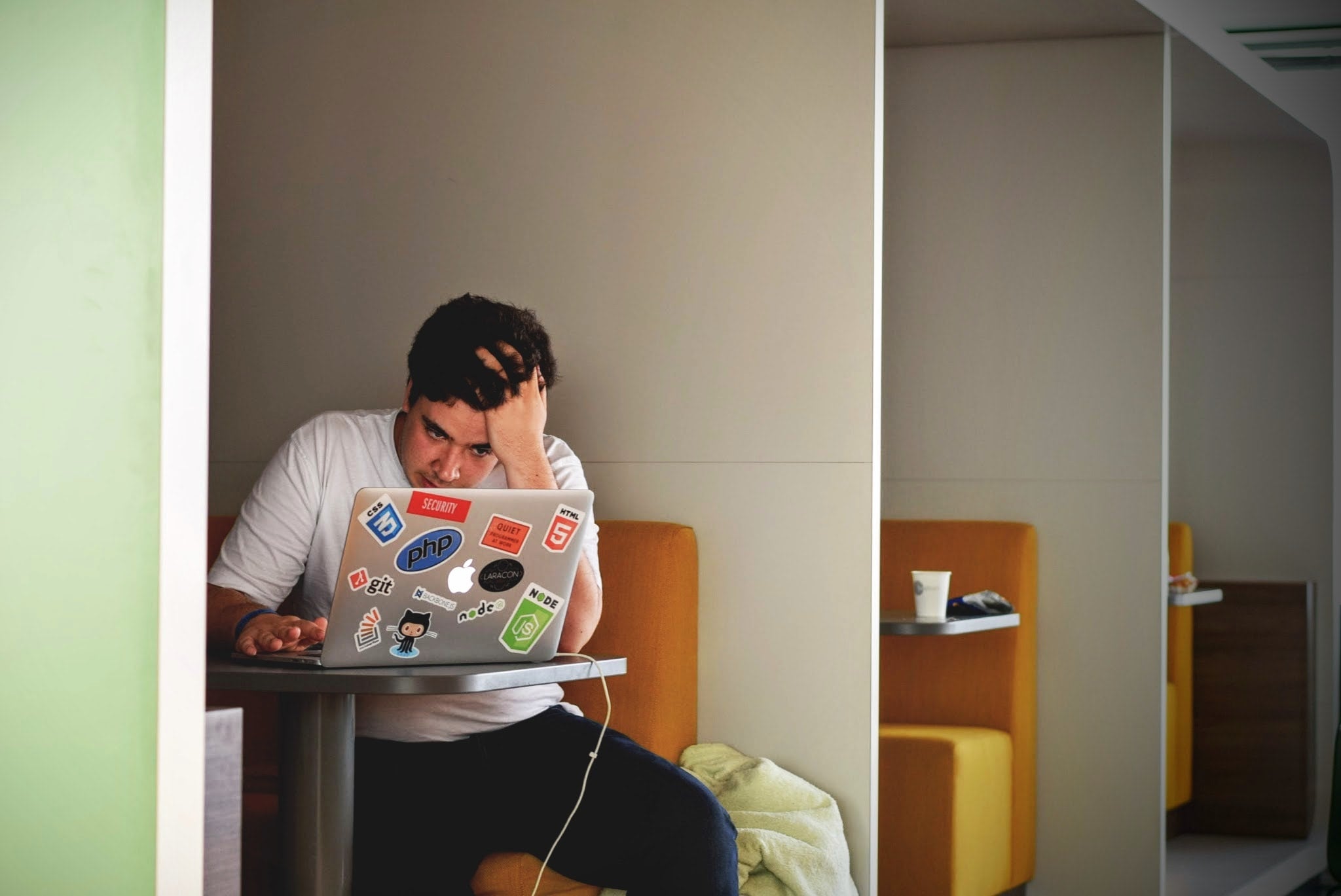
Stress is one of those terms that is used a lot in everyday conversation, even more so since COVID-19 has entered our lives.
If you’re feeling “a little stressed”, it can be useful to learn how to recognise signs of unhelpful stress and know some daily practices that can help you combat these feelings of unease.
What is stress?

When we encounter any type of stressful situation, including significant or ongoing change, the body’s typical protective response is stress.
This stress response is often referred to as our ‘fight or flight’ response. The ‘fight or flight’ is our alarm system and our body’s way of readying us for action when we encounter a threatening trigger (physical or psychological).
Kate Blundell, My Mirror’s Chief Psychologist, says if we can imagine the ‘fight or flight’ response from an evolutionary perspective we can understand it more easily.
“Imagine a group of cave people sitting by a fire. One of them notices a saber tooth tiger lurking in the shadows. This threat (the tiger) triggers the alarm and ‘fight or flight’ response. In this case, their breathing rate might increase, their heart may beat faster and they might feel a bit sick in the stomach. They could either get the hell out of there and away from the threat or fight it off,” explains Blundell.
“Now, imagine your body didn’t respond in this way: you see the tiger and respond, ’Ah, that’s interesting...You’re dinner.’” she adds.
Constant change can create high levels of stress, which if ongoing can be very uncomfortable and lead to other challenges associated with your mental wellbeing like emotional burnout, anxiety and even depression. However, in short-bursts stress can actually be extremely helpful (not just when a predator lurks).
Not all stress is unhelpful or harmful
Contradictory to the stigma around stress, not all stress is unhelpful or harmful.
As mentioned, stress can be a protective mechanism and therefore in some circumstances, can provide us with more:
- Energy and strength in physically demanding situations
- Composure in serious situations where someone’s safety might be compromised
- Focus, concentration and vigilance in situations where the pressure is on to perform or be productive
Know the symptoms and recognise your struggle
Firstly, no one is able to withstand unmanageable amounts of stress. It just isn’t humanly possible.
So, when we’re not coping very well with life ups and downs – or even just life’s busier times – our mind and body communicates this to us by way of some pretty clear emotional and physical signs.
Some of the first physical signs you might notice are muscle tension, tightness in your chest or shortness of breath, ongoing headaches or difficulty sleeping. Emotionally, you might also notice you’re more irritable and are feeling a bit overwhelmed.
Being able to recognise the emotional, cognitive, physical and behavioural reactions to unhelpful amounts of stress can be the catalyst to help you know when to reach out to a loved one about your concerns and engage in some self-care. This self-awareness is so valuable.
Further to this, being able to check-in with yourself can help you identify the right time to talk to a professional to help you unpack your emotions, thoughts and behaviours, identify your stress triggers and develop the tools you need to face change and stress with courage and resilience.
Blundell says the following are important emotional and behavioural signs you, or a loved one, might be struggling with the high levels of stress.
Emotional signs of unmanageable stress

Feeling constantly anxious, nervous or fearful – COVID-19 has left many with increasing worries about the future. Some worry is completely normal but those that lead to tightness in your chest, ongoing nervousness, causes your mind to race or catastrophise things, or fear everyday activities is something you should speak to a loved one or even a psychologist about. Try Health Direct’s symptom checker to gain initial insight into your symptoms.
- Feeling depressed, unhappy or moody – COVID-19 has prevented regular contact with friends, limited access to sporting, cultural and leisurely activities we cherish. This has limited social connectedness and our ability to reach out to our usual networks of support. This unnatural and uncontrollable change is difficult to process. Feeling irritable or down, when we’re coping with stress for a long period of time is stressful, tiring and uses up cognitive and emotional resources. In addition, when our resource tank is running low, we’re more likely to be snappy or feel irritable and even start to feel a bit helpless and down. If you’re experiencing these changes, it’s strong indicator that this level of stress is unhelpful and you may want to reach out to a psychologist to work through your emotions, thoughts and behaviours.
- Feeling worthless or lacking self-confidence – the impacts of COVID-19 may have generated concerns about your family’s financial position and your future employment opportunities. If this has left you or a mate experiencing constant concern and feelings of worthlessness, speaking to a psychologist can provide the tools to process and navigate life’s ups and downs.
- Feeling neglected or lonely – it may be the case that throughout life’s changes, you become distanced from those you once saw frequently. This is completely normal for the strengths of relationships to be tested during significant life changes. However, if this has left you feeling neglected or lonely, you might like to speak to a psychologist to unpack your thoughts and build your resilience.
Cognitive signs of unmanageable stress
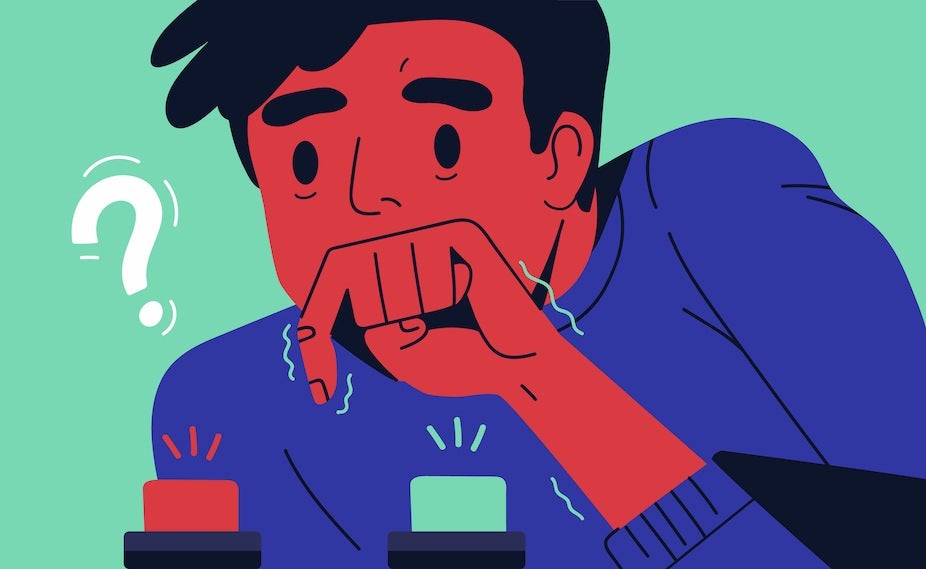
- Unable to make decisions easily – our focus narrows when we become stressed and with high and unrelenting stress our emotional brain begins firing and overrides our thinking brain. These factors significantly impact on our ability to think flexibly and easily, and effectively make decisions.
- Unable to concentrate – When we feel stressed, we often become hypervigilant, scanning the environment (both external and internal) for threat. This, along with the part of our brain that is running the show with unmanageable stress (as above) can significantly impact upon our cognitive resources and ability to concentrate.
- Negative thinking patterns – Our emotions also impact our thoughts. When managing high stress or worry, you’re more likely to notice thoughts like “What if”, thinking up worst-case scenarios and jumping to conclusions, and underestimating your ability to cope. These thinking patterns then form part of a negative cycle that maintains and exacerbates unhelpful stress.
Physical and behavioural signs of unmanageable stress
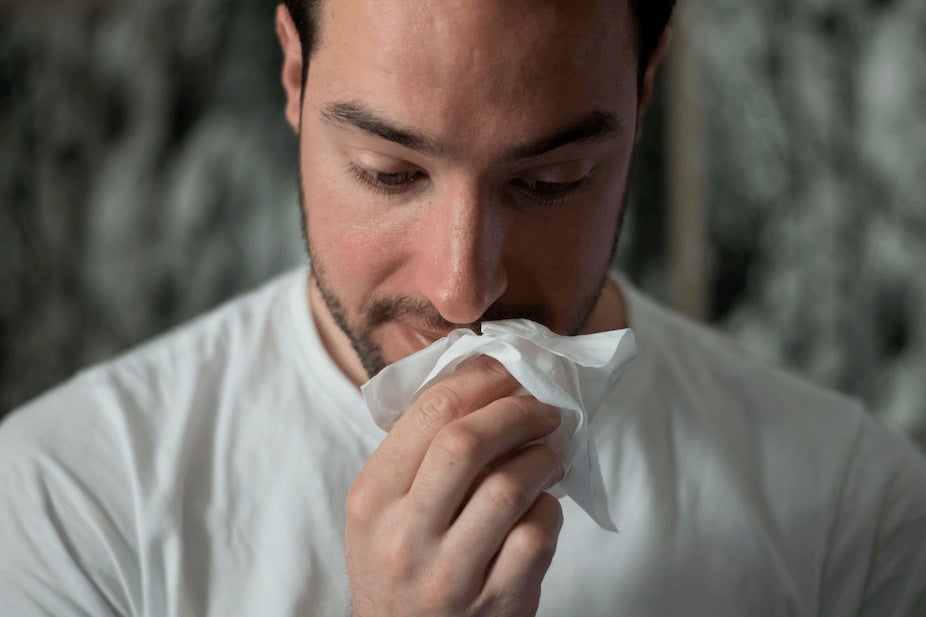
- Shifts in behaviour – with disruptions to daily structure, study routines and learning methods it is natural to feel increased frustration and concern. However, significant shifts in behaviour, like sleeping in past midday each day, could be indicators that you’re struggling more than usual and mean it is time to prioritise your mental wellbeing.
- Frequent sickness – stress may reduce your immunity and make you more susceptible to infections and bugs. If you’re getting sick more frequently, it may be worth speaking to your GP for a check-up and to consider the possible impact of stress.
- Emotional outbursts – uncertainties about the future, particularly with the impact of the COVID-19 pandemic could bring about emotional outbursts.
- Decreased energy – a lack of energy can be caused by prolonged stress.
- Sleeping and eating habits – stress can negatively impact your sleep and even impact your eating habits. If you’re noticing this in yourself or a mate, reach out for support.
- Illnesses and aches – as mentioned, stress can lead to physical illness. So, prolonged anxiety that are causing you shortness of breath, headaches, feeling physically unwell, sore eyes, muscle aches or heart palpitations be a sign that your worry is unhelpful for your mental wellbeing.
- Change in sex drive – stress can have an impact where we might least expect it and our desire for sex, or lack of enjoyment from sex are included.
- Physical changes – sometimes stress leads to changes such as grinding your teeth unknowingly, ache or biting your nails.
- Avoidance – stress can interrupt our lives so much that we might avoid loved ones and friends. When we start to feel overwhelmed or down, we might feel the urge to withdraw and spend more time on our own. This can be a downward spiral and lead to further low mood and feelings of isolation.
- Substance use and/or abuse – we all know that using alcohol, smoking or other substances as coping mechanisms for stress and strain is unhealthy. However, when you’re stressed, and particularly for younger Australians, it might be difficult to know where to draw the line. This is why My Mirror has partnered with the DrinkWise ‘You Got This’ campaign, to support young Aussies through life’s big changes in a healthy way.
6 Daily relaxation tips to reduce stress
1. Relaxed Breathing
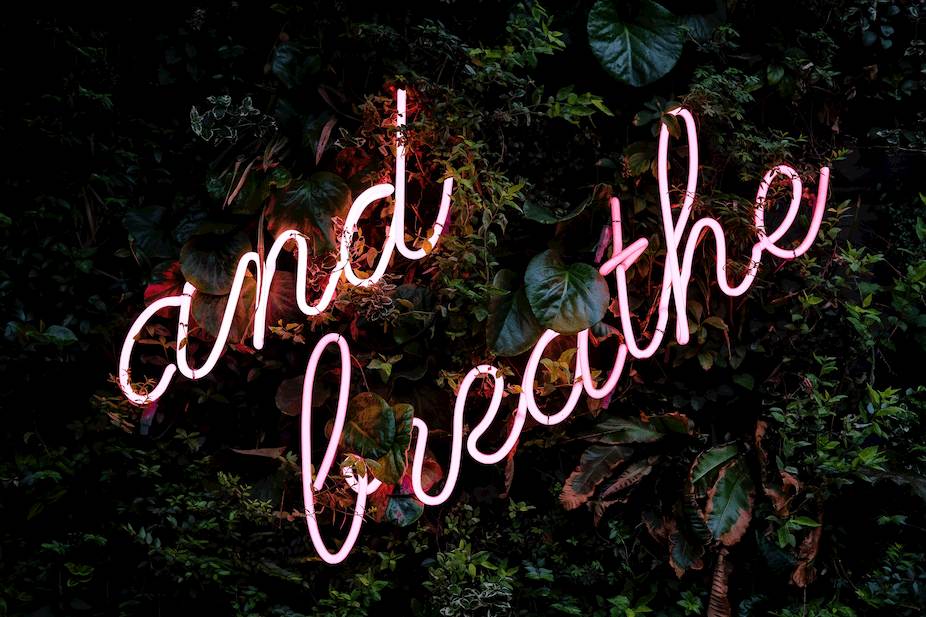
When our body is in stress response mode our sympathetic nervous system is firing. This causes our body to do things like speed up our breathing rate.
One of the most effective ways to activate our body’s natural relaxation response by slowing down our breathing and turning on our parasympathetic nervous system. Try this:
- Breath in slowly through your nose for the count of 4
- Pause and hold the breath for the count of 2
- Exhale slowly and gently through your mouth for the count of 4
- Repeat this for at least 10 breath cycles or until you feel your body beginning to relax
2. Progressive Muscle Relaxation

We hold tension in our bodies when we are stressed and it’s helpful to learn to notice this tension and release it to in turn, relax the mind. To do this, try this simple exercise:
- Sit comfortably or lie down flat and make sure your body and neck are well supported.
- Tense and Release: gradually work from your feet up tensing a body part, holding the tension for a moment and then releasing the tension and relaxing the body part.
- Sequence to tense and release the following (in this order):
- Feet and lower legs
- Upper legs and buttox
- Fists and arms
- Stomach and chest
- Shoulders, back and neck
- Face
- Whole body
Take time to notice the difference between tension and relaxation in your body.
3. Visualisation

Sometimes we need a little break and when a flight with a beach at the end isn’t currently an option or that practical day to day, sometimes it’s helpful to dive into our imagination.
Think about a place you’ve been or an imaginary place that makes you feel relaxed and happy.
Get comfortable and close your eyes, taking a few slow breaths. Use your imagination to explore this place with all of your senses – what is around you? What can you see? Is there anyone with you? What can you hear?
Spend 2-5 minutes just being in this place.
You might want to combine this visualisation with some more slow, calm breaths to really boost the relaxation factor!
4. A Mindful Break Meditation

When we’re stressed our mind is often racing in all different directions. An effective way to give yourself a mental break is to fully immerse yourself in the present moment. Immersing yourself in the present moment can also increase our enjoyment in what we are doing. Using our five senses is a simple way to do this. This exercise is about fully focusing on whatever it is you are doing (washing the dishes, brushing your teeth, taking a shower, walking or just sitting and taking in the scene at the park).
- Notice the things that you can see (what colours, shapes, and things can you see around you).
- What can you hear? Remember not to judge these things as good or bad, they are just part of the present moment.
- What can you feel or touch?
- Can you smell anything in your environment (tooth paste, a perfume, a flower or just fresh air)?
- Notice your sense of taste. I like to do this with a piece of chocolate or cheese but, even while you’re not eating, you might still notice the remnants of a taste or a lack of.
Try doing this or repeating this sequence for at least two minutes.
5. Dive Reflex

When we’re feeling really overwhelmed or even a bit panicky, some of the above techniques can be a bit challenging to use. Another really effective way to turn on our body’s natural relaxation response which requires less concentration is called the Dive Reflex. This reflex is activated when our face is cooled and we hold our breath (like when we dive underwater) and allows our body to conserve energy and resources, in turn calming our physiological response.
To activate the dive reflex:
- Put your face in cold water or hold a cold wet towel on your forehead and under your eyes.
- While doing this, you can also try holding your breath (for about 20 seconds or as long as is comfortable).
- Remove the towel or take your head out of the water.
This is a quick and easy way to calm your nerves and reduce the body’s stress response.
6. Yoga
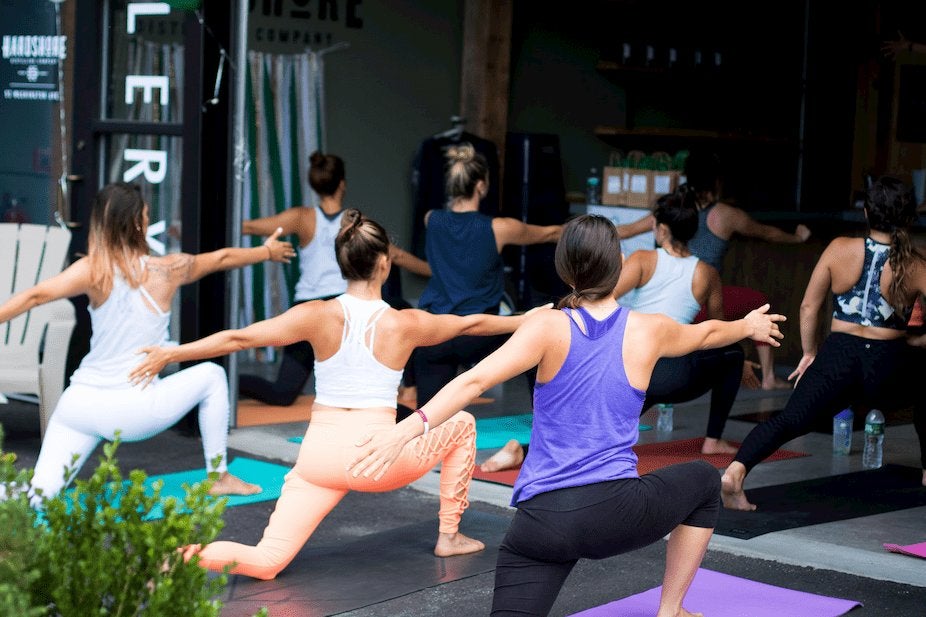
If you need something more concrete and physical, yoga and ti chi have been well established to decrease stress and improve relaxation. These exercises get the body moving and also involve breath work to help you to regulate and slow down your breathing. Scheduling a regular class (online or in-person) into your schedule or just using an app for a quick five minute yoga break at home is an effective way to keep you on track with your relaxation practice. We recommend a gentle yoga practice such as Yin, to get the most relaxation out of your stretching and movement.
Whatever relaxation exercise floats your boat, we recommend practicing! The more you try these things, the more automatically and effectively they are able to be used in the face of stress.
Setting achievable goals can help you make small changes
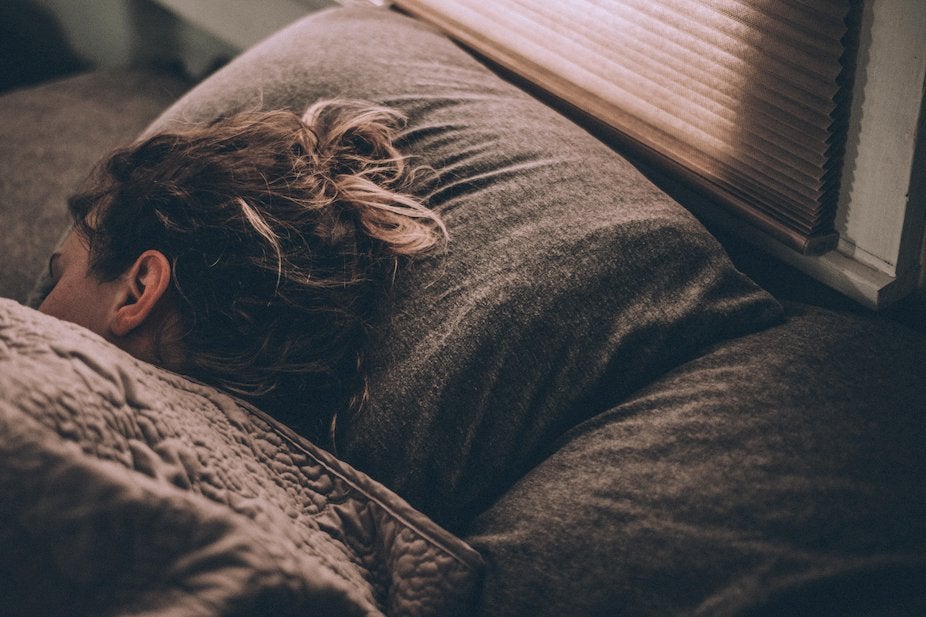
We all know the following is true but we’ll say it anyway: getting enough sleep and exercising are some of the most effective ways to manage your body’s stress response, and manage your emotional and physical wellbeing.
When we journey through life’s more challenging times, we sometimes stray from our healthy sleep and exercise regimes.
Challenge yourself to go to bed 30 minutes earlier than usual for one week and if you meet this challenge see whether you can keep it up for longer.
In addition, challenge yourself to get moving a little bit more. For some of you, the combination of stress and COVID-19 restrictions may have meant you have put exercise on the back burner. This may have been the case for Australia’s 180,000 Year 12 students who have recently completed their final exams, for instance.
What better way to combat stress than to engage in some self-care and get moving? Start with a goal of taking a walk for 30 minutes 2-4 times and week and increase your goals from there.
If you’re looking for some other daily tips to manage stress, give one of the below exercises a go, as suggested by My Mirror’s Chief psychologist, Kate Blundell.
Remember, that stress management techniques aren’t a one size fits all and you might have to try a few different things to find the right fit for you. We’d also recommend scheduling a relaxation exercise into your daily schedule, using apps as a guide (such as Headspace or Calm).
